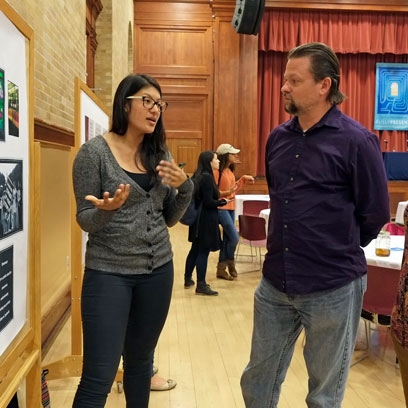‘Academic Clusters’ Offer New Complement to Majors and Minors

MIDDLEBURY, Vt. – The words privilege and poverty do not appear on Middlebury’s list of majors or minors, yet both are increasingly hot topics for undergraduate students. Professor of Religion James Davis saw this trend a few years ago and wondered if there was a way to develop a grouping of courses across the disciplines that would bring focus and relevance to the idea of privilege and poverty. The result of his work is the inaugural Privilege & Poverty academic cluster, a new model for academic focus that the College hopes to replicate in other areas outside of traditional major and minor delineations.
“We wanted it to be an adjunct course of study, a complement to the major that would prepare students to be responsible citizens around this issue, regardless of whether they were, for instance, an economics, psychology, or literature major,” said Davis.
Davis says when he first began developing the idea of Privilege & Poverty, he steered away from making it a stand alone major because he wanted to ensure that a wide range of students could pursue the topic, regardless of what else they were focusing on at Middlebury.
Davis was also looking for something more interdisciplinary than traditional minors, and he wanted to shape a program that would be receptive to cocurricular, place-based learning, such as internships.
“We thought the cluster would encourage the experience of real community among faculty, staff, and students around the topic of the cluster, in part by bringing together folks who otherwise wouldn’t be regularly engaged with one another,” said Davis.
The Privilege & Poverty cluster brings together faculty, students, and staff interested in studying economic inequality—its causes, its effects on human communities and the environment, and even the language used to describe the “privileged” and the “poor.” The cluster, which is open to all students, regardless of major, consists of a flagship course titled Privilege & Poverty: The Ethics of Inequality, three elective courses, an internship, and a self-designed capstone experience. Davis and Tiffany Sargent ’79, director of the Center for Community Engagement, codirect the cluster, with Davis as academic director and Sargent supervising internships.
While the Privilege & Poverty program is still evolving, Davis says it has already achieved its goals and he has been discussing ideas for additional clusters that might include topics such as communications, prison education, ethnic studies, food, contemplative practice, and listening and speaking.
“If students and faculty seize the opportunity that this model offers, I think we could see some dynamic pods of intellectual community popping up on campus in the next several years, and that’s pretty exciting to imagine,” said Davis.
Taylor Banaszewski ’17, who majored in economics and minored in sociology, is Privilege and Poverty’s first graduate. She says her interest in personal financial stability led her to explore offerings across the curriculum that approached the subject in different ways. “Before I learned about the formal cluster, I had already been taking courses related to this topic and it was great for me to have a formal program to help me make sense of the courses I was taking,” she said.
Banaszewski enrolled in the flagship course her junior year, introducing her to perspectives on economic inequality that would later serve as a foundation for her summer internship with the national Shepherd Higher Education Consortium, where she worked on a financial coaching program.
The College’s Educational Affairs Committee recognized that if the work Davis had been doing with Privilege & Poverty could be applied more broadly across the curriculum, it could help students make more meaningful connections among the courses they took, says Emily Proctor, interim dean of curriculum.
“It could help students articulate for themselves why the particular mix of courses they choose are valuable for their own specific learning goals, even though clusters do not officially appear on their transcripts,” said Proctor.
Proctor said the College is in the process of developing a tool that will allow faculty members to identify clusters of courses across the curriculum that complement each other, and publish those groupings on the College website so that the information is available to all students.
For more information, visit the Privilege & Poverty website.

